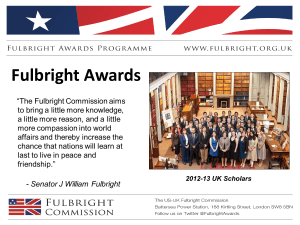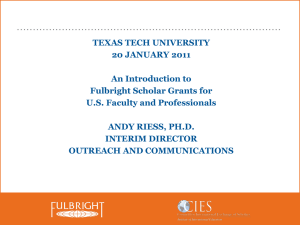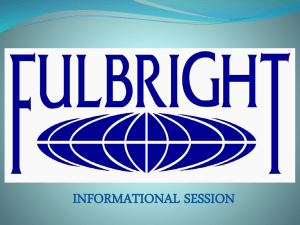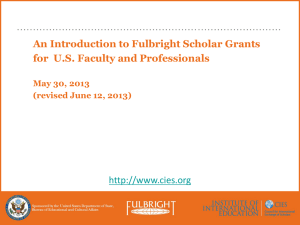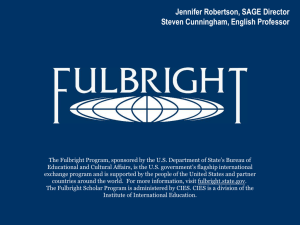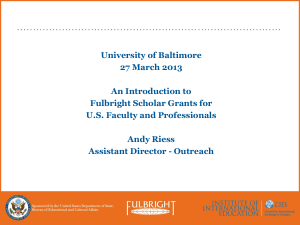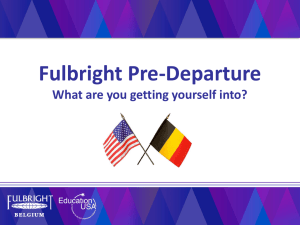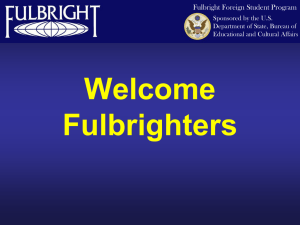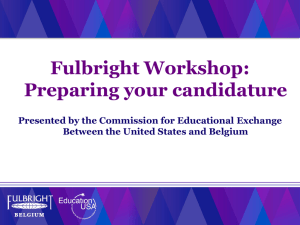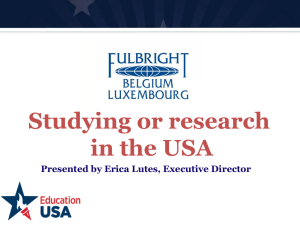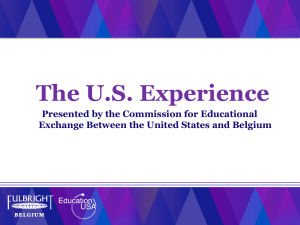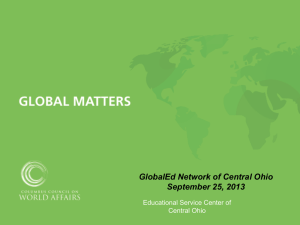Fullbright Scholar Information Session Presentation
advertisement
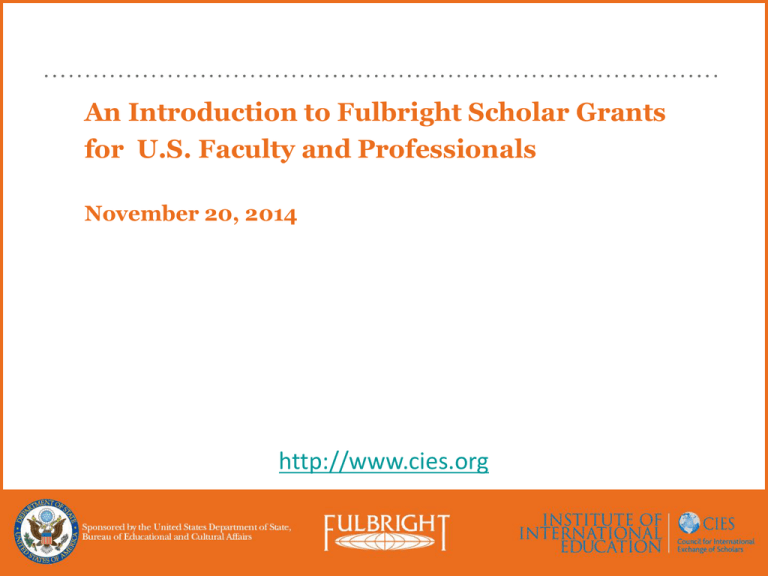
An Introduction to Fulbright Scholar Grants for U.S. Faculty and Professionals November 20, 2014 http://www.cies.org Program Overview Justin Miller Director Sponsored Program Office 285-5085 jmmiller5@bsu.edu Fulbright Ambassador Dominic Caristi Telecommunications 285-1493 dgcaristi@bsu.edu Presentation Overview • Introduction & History • How to apply for Fulbright Scholar grants • Additional Fulbright Scholar opportunities for U.S. faculty and professionals • Fulbright Visiting Scholar opportunities The Fulbright Program, sponsored by the U.S. Department of State’s Bureau of Educational and Cultural Affairs, is the U.S. government’s flagship international exchange program and is supported by the people of the United States and partner countries around the world. For more information, visit fulbright.state.gov. The Fulbright Scholar Program is administered by CIES. CIES is a division of the Institute of International Education. History Fulbright Scholar Program • Established in 1946 • Sends U.S. academics and professionals overseas and brings scholars and professionals from abroad to the U.S. Senator J. William Fulbright (1905-1995) “International education exchange is the most significant current project designed to continue the process of humanizing mankind to the point, we would hope, that nations can learn to live in peace.” • Sponsored by U.S. Department of State’s Bureau of Educational and Cultural Affairs • Administered by the Institute of International Education’s Council for International Exchange of Scholars (CIES) Eligibility • U.S. citizen • Ph.D. or terminal degree • University teaching experience • Well physically/mentally; not a felon • Foreign language requirement for some programs Fulbright Postdoctoral/Early Career Grants • Postdoctoral/early career grants are open to U.S. scholars who have recently completed their doctoral degrees – typically within the five previous years. The number of such Fulbright Scholar awards has grown, particularly for research activities. A few awards include teaching opportunities as well. Postdoctoral awards are available in STEM fields, the arts, humanities and social sciences. Specialists in public health should take special note of the FulbrightFogarty Postdoctoral Awards for research at a National Institutes of Health Fogarty site in Botswana, Ghana, Kenya, Malawi or Zimbabwe through the African Regional Research Program, or in South Africa, Bangladesh or Peru. Grant lengths for the programs listed below range from one semester to 20 months, depending on the host country. • Several countries have developed awards that offer early career scholars research opportunities. These awards are similar to postdoctoral research awards, so scholars within five years of completing a doctoral program should pay special attention to those as well. • Postdoctoral/early career grants present an excellent opportunity for recently minted scholars to deepen their expertise, to acquire new skills, to work with additional resources and to make connections with others in their fields. Scholars will be expected to engage with graduate students in the host country and to be involved with host university training in cutting edge research in their specializations. Fulbright Postdoctoral/Early Career Grants In the current Fulbright Award Catalog the following programs have postdoc and/or early career opportunities: Albania Bangladesh Bosnia and Herzegovina Botswana Brazil Burkina Faso Cambodia Canada Colombia Croatia Czech Republic Democratic Republic of the Congo Denmark Ecuador Egypt European Union Affairs Finland France Germany Ghana Greece Hong Kong Hungary India Ireland Israel Italy Jordan Kazakhstan Kyrgyz Republic Lithuania Macedonia Malaysia Mozambique Namibia Netherlands New Zealand Nigeria Norway Oman Palestinian Territories Panama Peru Philippines Poland Romania Russia (Russian Federation) Saudi Arabia Singapore Slovak Republic South Africa Spain Sweden Uganda Ukraine United Kingdom Fulbright-Fogarty Postdoctoral Awards Sub-Saharan Africa Regional Research South and Central Asia Regional Research Program Fulbright Flex Awards • In order to engage U.S. scholars currently unable to spend extended periods of time abroad, the Fulbright Program welcomes applications from scholars who propose multiple, short-term stays in the host country over a period of two to three years. The Flex Award is also designed for scholars who require multiple visits abroad to accomplish their research objectives. In addition to their research activities, Flex award scholars will be required to give public talks, participate in seminars, mentor students, and otherwise engage with the host country academic community. Applications that propose grant periods during the host institution’s academic year are preferred. • Applicants should clearly indicate plans for their Flex grant in their project statements. Specific details on invitation requirements and grant length will vary by country, and can be found in each individual award listing. Some programs may offer opportunities for multi-country research, but these should be discussed with the appropriate CIES staff. Fulbright Flex Awards In the current Fulbright Award Catalog the following programs have flex grant opportunities: Asia and Pacific Burma China Hong Kong Cambodia Japan Macao Mongolia Singapore Vietnam Europe and Eurasia Albania Armenia Azerbaijan Belarus Bosnia and Herzegovina Croatia Estonia Finland Georgia Germany Greece Kosovo Latvia Lithuania Luxembourg Macedonia Malta Moldova Montenegro Russia Serbia Slovenia Spain Sweden Ukraine United Kingdom Middle East and North Africa Bahrain Egypt Kuwait Morocco Palestinian Territories Saudi Arabia United Arab Emirates South and Central Asia Bangladesh India Kazakhstan Kyrgyz Republic Nepal Republic of Maldives Tajikistan Sub-Saharan Africa Benin Botswana Burkina Faso Cameroon Cote d’Ivoire Democratic Republic of Congo Ethiopia Ghana Guinea Kenya Malawi Mauritius Mozambique Namibia Nigeria Senegal Sierra Leone South Africa Swaziland Tanzania Uganda Zambia Zimbabwe Western Hemisphere Argentina Barbados and Eastern Caribbean Bolivia Brazil Canada Colombia Costa Rica Dominican Republic Ecuador El Salvador Haiti Honduras Nicaragua Panama Paraguay Peru Suriname Trinidad and Tobago Uruguay Venezuela Worldwide Opportunities Core Scholar Program Opens: February 1, 2015 Deadline: August 1, 2015 Categories of awards: • Teaching • Teaching and Research (T&R) • Research Teaching English as a Foreign Language • Beginning with the 2014-2015 competition, opportunities for scholars specializing in Teaching English as a Foreign Language (TEFL) and associated fields are being organized and showcased in an entirely new way by the Fulbright Scholar Program. Although grants will continue to be made to a specific country, all TEFL opportunities are now grouped under a single award number (#4000). By presenting the full range of TEFL within a worldwide context, potential applicants will be able to examine and compare more than 50 country options simultaneously. Applicants may indicate either: “open to any placement” if they have no specific country or region in mind, or one world area or as many as three country preferences. Letters of invitation are not required. • As many as 60 grants are anticipated. The award supports a priority for English language teacher training in any of over 30 areas of specialization. A Ph.D. is not required. Opportunities are open to a wide range of scholars and, in many countries, professionals as well. Applications will be evaluated by a TEFL-specific review committee in the U.S., and if recommended, sent for consideration in a country or countries of interest. This streamlined review process and the ability to apply to more than one country make this an ideal time for scholars with experience training English teachers to consider participating in the Fulbright Scholar Program. • For specifics of awards, the participating countries will provide access to more detailed information. Opportunities by Region Total Number of Awards for 2014-15: 594 (totaling app. 800 grants) • Sub-Sahara – Africa (81) • Middle East and North Africa (48) • East Asia / Pacific (55) • Europe (284) • Western Hemisphere (98) • South & Central Asia (28) Advantages • Premier program for exchange • Opportunity to establish new ties • Internationalization of own campuses • New teaching/research insights • Personal/family experience Application Process General instructions and application forms • Awards by country (5 world areas) • Each award has distinctive number • Grant stipends and benefits • Discipline index • Forms Selecting an Award • Awards are created in the hosting country by the local Fulbright commission or the American embassy • Country listings • Activity? Teaching, research or both • Indices – by Discipline or All Discipline *50% of grants are All Discipline awards* • Read award descriptions and stipend information carefully, especially for Early Career / Flex awards • Contact CIES program officer(s) for more information about awards and countries Information on the Web Up-To-Date • Some awards require invitation • Website – information about contacts abroad • Program officers: storehouses of knowledge! Submitting A Competitive Proposal • Follow instructions! • Project statement – Up to 3-5 single-spaced pages – What you bring, what you plan to do – Reviewed by specialist/non ; in U.S./abroad – Specific requirements for each category • Curriculum vitae–tailored; 6 pages Submitting A Competitive Proposal Attachments: • Course Syllabi/Outlines/Reading Lists – Teaching or Research/Teaching – 2-3 courses – 10 page limit • Bibliography – Research Only – 3pgs • Specific attachments for the arts, architecture, writing, and journalism Reference Letters • Research award – 3 letters • Lecturing or Lecturing/Research awards – 1 teaching report; 2 reference letters • At least one from outside home institution • Teaching report from home dean or chair • Referees submit letters online General Tips • Teaching – Familiarize self about country/situation – Educated guess about what will teach – Awareness of need to adapt – Match of expertise/program – Letter of invitation? – Sample course syllabi – 10 pages More Tips • Research – Define the project/methodology – Select bibliography – 3 pages – Need/relevance/advantage/feasibility – Consider culture/politics – Plans for dissemination • Teaching & Research – Follow directions for both lecturing/research – Relative proportions reflected in statement Stipends and Benefits • Refer to links on Fulbright web site at www.cies.org • Stipends and benefits vary greatly, depending on award Standard Stipends and Benefits Structure • Base stipend (for some programs) • Travel and relocation • Maintenance for living in country of assignment • Other benefits • Tuition assistance Salary Worries • Ball State is supportive! • You can still receive your full academic year salary – How? Considerations • Many Fulbright programs do not offer a stipend. • In this case, you might need an approved special assigned leave of absence to continue to earn your salary and benefits. (Note that full-year leaves only provide ½ academic year salary.) • This is where a Flex award might be beneficial Example Fulbright Award = $30,000 (Stipend) Depart. Cost Share = $30,000 ---------Faculty AY Salary = $60,000 Fringe benefits = $19,200 (to be covered by MGR funds) Salary Supplement Stipends (new for 2014-15) For 2014-2015, for scholars on teaching or combined teaching/research grants to certain countries, a salary supplement stipend will be added if the total grant stipend and subsistence allowance plus home institution pay during the grant period is less than gross base salary (excluding summer teaching, merit awards, consulting fees, etc.) for the grant period. The salary supplement stipend will bring the amount to the same level as the individual’s salary for a comparable period, up to a maximum of $10,000 per full grant month. This added supplement applies ONLY to earned salary as defined above and does not include royalties or other similar types of income. Flex awards are not eligible for salary supplement. Prior to Submission • Contact staff member in SPO – Preliminary budget development – Narrative assistance available – Clearance Sheet will be prepared and routed prior to submission Review Process and Timetable • Step 1: CIES Program officers review applications for eligibility, completeness, etc. (August) • Step 2: Discipline review committees read applications electronically. (September) • Step 3: U.S. peer review committees. Committees represent many disciplines and focus on one world area. (October to December) Review Process and Timetable • Step 4: Applicants receive notice of their status, either recommended or not recommended. (November through January) • Step 5: Applications of recommended candidates are forwarded to host countries for selection and to the J. William Fulbright Foreign Scholarship Board, which has final approval. Applicants are notified as approvals are given. (February through May) • Step 6: Grant Packets are sent to selected grantees. (May through June) • 1:3 Success Rate – Dependent on area Other Fulbright Programs • Distinguished Chairs • Administrators programs • Alumni Initiative • Visiting Scholars (to U.S.) Additional Opportunities for U.S. Scholars • Fulbright Specialist Program • Seminars for International Education Administrators • German Studies Seminar • Fulbright NEXUS Regional Scholar Program Fulbright Specialist Program • Two- to six-week consulting and/or teaching opportunities • Online application to Fulbright Specialist roster with rolling deadline • Institutions overseas develop projects and request specialists from the roster • Program does not support research • Twenty-five eligible disciplines, including new STEM education fields • Minimum of two years between grants Global Initiatives The International Education Administrators (IEA) seminars help U.S. higher education administrators establish lasting connections within the social, cultural and higher education systems of other countries. Selected administrators have the opportunity to gain in-depth knowledge about the host country’s higher education system as well as to establish networks of U.S. and international colleagues. Grantees return home with enhanced ability to serve international students and encourage prospective study-abroad students. The IEA Seminars are open to experienced international education administrators and senior administrators responsible for enhancing the international dimensions of their institutions. A Ph.D. is not required. Countries Served: India, Russia, United Kingdom, Korea, Japan, Germany, France Rolling Deadlines Global Initiatives The Fulbright Regional Network for Applied Research (NEXUS) Program will bring together a network of junior scholars, professionals and mid-career applied researchers from the United States, Brazil and other Western Hemisphere nations for a series of three seminar meetings and a Fulbright exchange experience. At its core, the Fulbright NEXUS Program fosters collaborative and multidisciplinary research to address challenging regional issues and produce tangible results. Twenty outstanding scholars and practitioners from the U.S. and abroad will be selected as Fulbright NEXUS Scholars to participate in the program through an open competition. Five of the scholars will be selected from the United States. Program activities will commence in June 2014 and conclude in May 2016. The Fulbright NEXUS Program will provide a platform for scholars from across the region to engage in collaborative thinking, analysis, problem-solving and multi-disciplinary research in one of five areas: – – – – – Renewable Energy, including Micro-Grid Innovations; Social and Behavioral Adaptation to Climate Change; Measuring Climate Change and its Impact (Metrics and Standards); Climate Change and Biodiversity; Climate Change and Food and Water Security Core Fulbright Visiting Scholar Program • Visiting Scholars from other countries research, teach and help internationalize U.S. campuses • Overseas scholars should contact the Fulbright commission or U.S. Embassy in their home countries • Letter of invitation from potential host is always useful Fulbright Occasional Lecturer Fund (OLF) • Travel support for Fulbright Visiting Scholars already in the U.S. for short-term guest teaching • Contact: OLF@iie.org Fulbright Scholar-in-Residence Program • Brings scholars and professionals from abroad to campuses that do not often host visiting scholars • Involves colleges and universities that serve student populations underrepresented in international exchange programs • Application is made by the interested U.S. institution • Deadline is OCTOBER 17 • Contact: SIR@iie.org Other Fulbright Programs • Fulbright U.S. Student Program – For recent graduates, postgraduate candidates up through dissertation level and developing professionals and artists to study and research abroad – Administered by Institute of International Education, IIE www.fulbrightonline.org/us • Fulbright Teacher and Administrator Exchange – Principally for primary- and secondary- level educators – Administered by FHI http://www.fulbrightteacherexchange.org/ • Fulbright-Hays Awards – For faculty research, group projects and seminars abroad in certain social sciences and humanities fields – Administered by the International Education and Graduate Programs Service of the U.S. Department of Education www.ed.gov/about/offices/list/ope/iegps Thank you For more information, visit www.cies.org
